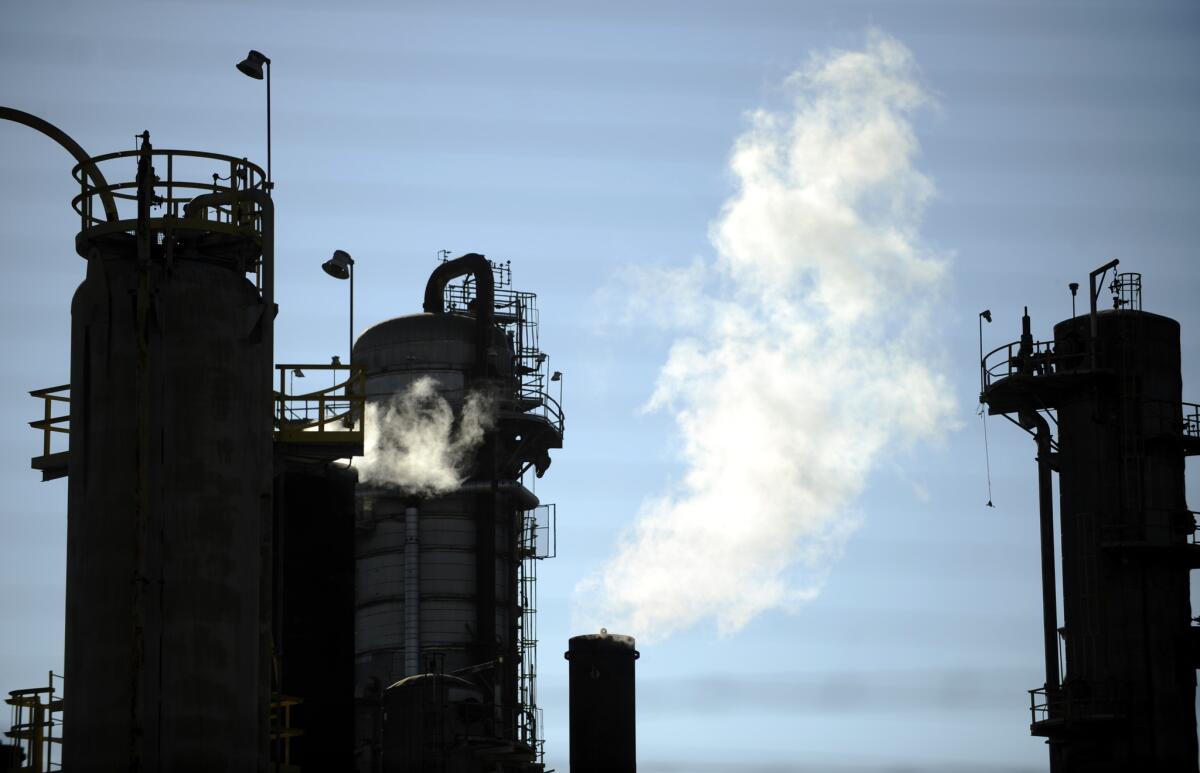Damaged Torrance Exxon refinery sold; gas prices unlikely to drop soon

The Exxon Mobil refinery in Torrance has been closed since an explosion at the site in February in which four people were injured.
ExxonMobil’s damaged Torrance plant will be bought by a New Jersey-based oil refining company. The $537.5-million deal, announced Wednesday, will take effect after repairs have been completed early next year.
Consumers will see no immediate effect on gasoline prices in the Los Angeles area, where they’ve paid as much as $1.50 more a gallon than the rest of the nation after an explosion ripped through the refinery in February.
PBF Energy, a Fortune 200 company based in Parsippany, N.J., said it plans to offer all existing employees the opportunity to stay with the company, including contractors. PBF officials plan to meet with employees Thursday morning.
The deal is expected to close in the second quarter of 2016, said Jeffrey Dill, president of PBF Energy Western Region.
The Torrance facility normally provides 10% of the state’s gasoline capacity and 20% of the capacity in Southern California. The blast forced ExxonMobil to reduce production to less than 20%, contributing to the surge in gas prices.
The explosion injured four people. State and federal regulators are investigating the cause of the blast and ExxonMobil’s handling of the incident. Under the deal, PBF assumes no liability.
“Anything to do with the February explosion remains with Exxon,” Dill said.
Analysts had expected the refinery to return to full production by July. When that didn’t happen, gasoline prices jumped. Inventories fell as California struggled to import the state’s special low-pollution blends.
With a relatively small number of refineries in California and few out-of-state plants capable of producing California blends, a refinery shutdown here has an outsized effect on supply and prices.
Although gas prices dropped across the U.S. this summer, California prices didn’t drop at the same rate in the explosion’s aftermath.
Industry analyst Bob van der Valk said the purchase and the assurances of repairs in Torrance will eventually help bring gasoline prices back to normal in the L.A. area.
“You’re not going to be $1 above the rest of the nation,” Van der Valk said. “It will be more like 30 or 40 cents. That’s good news.”
The incident put ExxonMobil under heavy pressure from regulators and politicians. On Aug. 13, Cal/OSHA issued 19 citations against Exxon over the explosion and fined the company $566,600.
Reps. Maxine Waters (D-Los Angeles) and Ted Lieu (D-Torrance) added to the pressure on Exxon in a letter to the company’s chairman, Rex Tillerson, two weeks ago.
Waters and Lieu wrote that they were “deeply concerned by recent efforts by Exxon Mobil to push back against the investigations by the California Division of Occupational Safety and Health and the U.S. Chemical Safety Board.”
Waters and Lieu also noted that the company has failed to produce documents subpoenaed by the Chemical Safety Board.
“It’s good for the market to have more independence with a newcomer to the market,” said Jamie Court, president of advocacy group Consumer Watchdog. “And I think it’s better to have a smaller player rather than one of the big four.”
Court said he hopes PBF will evaluate chemicals and processes used at the plant to ensure best environmental practices.
“There still needs to be a net environmental benefit to state,” Court said.
The Torrance refinery has a long history. In 1929, Scottish sea captain John Barneson built it to fuel ships in the Los Angeles harbor with recently discovered crude oil from the San Joaquin Valley. In the beginning, the refinery processed 30,000 barrels of crude oil per day.
When working, the refinery can process an average of 155,000 barrels of crude oil a day and produce 1.8 billion gallons of gasoline per year. Set on 750 acres, it employs about 650 workers and 550 contractors.
In addition to the Torrance refinery, PBF also is set to close on the purchase of the ExxonMobil Chalmette refinery in New Orleans.
PBF began as a private equity firm in 2008 and now has a market capitalization of $2.4 billion and 1,800 employees. It currently operates refineries in Delaware, New Jersey and Ohio. The two
ExxonMobil plants will increase PBF’s production by 60%.
“Southern California is a very attractive market and we are excited to become a supplier in the region,” Tom O’Malley, PBF’s executive chairman, said in a prepared statement.
Torrance Mayor Patrick Furey said he was relieved to hear from PBF that the company plans to keep employees and keep the plant running. Since the explosion reduced production at the facility, the city has lost millions in tax revenue, Furey said. He said a dramatic reduction in the $700,000 to $800,000 a month the city received in tax revenue has forced the city to tap reserves to balance out losses.
“The good news is we have the wherewithal to plow through that,” Furey said. “We always knew [the refinery] would come back online. The sooner it comes back the better.”
Twitter: @ivanlpenn
MORE FROM BUSINESS
More baggage fees: Amtrak joins airlines
VW and Audi give back Green Car of the Year awards
The big switch to chip-enabled credit cards: What you need to know
More to Read
Inside the business of entertainment
The Wide Shot brings you news, analysis and insights on everything from streaming wars to production — and what it all means for the future.
You may occasionally receive promotional content from the Los Angeles Times.











